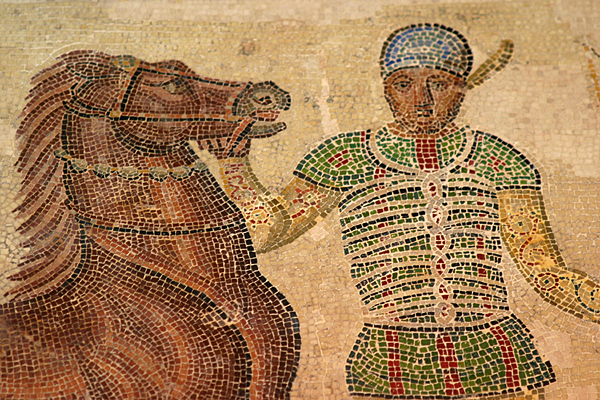

"In every city the population has been divided for a long time past into the Blue and the Green factions; but within comparatively recent times it has come about that, for the sake of these names and the seats which the rival factions occupy in watching the games, they spend their money and abandon their bodies to the most cruel tortures, and even do not think it unworthy to die a most shameful death. And they fight against their opponents knowning not for what end they imperil themselves, but knowing well that, even if they overcome their enemy in the fight, the conclusion of the matter for them will be to be carried off straightway to the prison, and finally, after suffering extreme torture, to be destroyed. So there grows up in them against their fellow men a hostility which has no cause, and at no time does it cease or disappear, for it gives place neither to the ties of marriage nor of relationship nor of friendship, and the case is the same even though those who differ with respect to these colours be brothers or any other kin. They care neither for things divine nor human in comparison with conquering in these struggles; and it matters not whether a sacrilege is committed by anyone at all against God, or whether the laws and the constitiution are violated by friend or by foe; nay even when they are perhaps ill supplied with the necessities of life, and when their fatherland is in the most pressing need and suffering unjustly, they pay no heed if only it is likely to go well with their 'faction'; for so they name the bands of partisans....so that I, for my part, am unable to call this anything except a disease of the soul."
Procopius, History of the Wars (I.24.1ff)
Although there always had been four factions, the Blues and Greens came to predominate. Vitellius and Caracalla both supported the Blues. But it is the Greens, first mentioned in AD 35, who enjoyed the greatest popularity. Caligula, Nero, Domitian, Verus, Commodus, Elagabalus, even the cook in the Satyricon of Petronius, all were fervent advocates of the Greens. Marcus Aurelius, on the other hand, gives thanks in his Meditations (I.5) that he was a partisan of neither faction.
Suetonius relates that Caligula often would dine with the Greens and spend the night in their stables (Life of Caligula, LV.2) and, for special games, have the Circus decorated in red and green (XVIII.3). Nero, too, would strew the track with green and wear the colors of his team (Dio, Roman History, LXIII.6.3). Caligula even had his own track, the Gaianum (Dio, LIX.14.6), where Vitellius once was hit by a chariot while driving with the emperor and injured his thigh (Suetonius, Life of Vitellius, XVII.2).
But imperial enthusiasm also could be deadly. One morning, Caligula was so perturbed by the noise of spectators arriving early to claim free seats that he ordered the Circus to be cleared. There was a riot and a number of people were killed, including twenty equites and as many matrons (Life of Caligula, XXVI.4). He also was not above poisoning rival horses and charioteers (Dio, LIX.14.5), and Caracalla had a charioteer killed because he favored the Greens, even though, in his youth, the man had won 782 races (LXXVIII.1.2). Indeed, says Herodian, the emperor once was so infuriated by the crowd jeering his favorite charioteer that he sent soldiers into the stands, who arrested or killed all they encountered (Roman History, IV.6.4–6). Vitellius, too, executed some of the plebs because he suspected that their disparagement of the Blues, in fact, was directed toward him (Suetonius, Life of Vitellius, XIV.3). Obviously, such outrageous behavior undermined the civilitas that the emperor was expected to demonstrate at the games.
Courted by the emperors, themselves, some charioteers attained power far beyond their station. Caligula once gave a driver two million sesterces in gifts (Suetonius, Life of Caligula, LV.2). One charioteer of the Greens befriended by the emperor was allowed use of the praetorian guard to build stables (Josephus, Antiquities of the Jews, XIX.4.4). Elagabalus, too, was so enamored of a charioteer whom he had seen fall from his chariot that "he even had greater influence than the emperor himself" (Dio, LXXX.15.1-2). The loathsome Tigellinus, who had denounced Petronius and is characterized by Tacitus in the Histories as "A man of humble birth, vicious childhood and dissolute maturity" (I.72), was appointed praetorian prefect. He had come to the attention of Nero because of the quality of the horses he was able to provide. And it was in the "circus and theatres, where the mob can demonstrate with the greater impunity," that the crowd clamored for his death.
In the Hippodrome of Constantinople, the violence of the factions became even more riotous.
The illustration depicts a member of the Green faction and is part of the Quattro Aurighe mosaics in the Museo Nazionale Romano (Rome).
Reference: Procopius: History of the Wars [The Persian War] (1914) translated by H. B. Dewing (Loeb Classical Library).